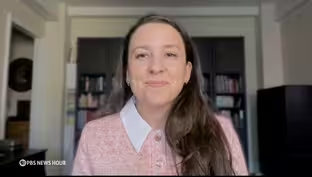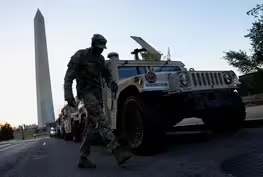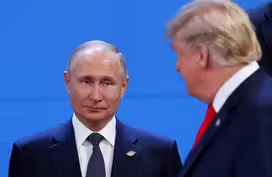
Trump’s AI chip deal sparks legal questions
Clip: 8/13/2025 | 5m 32sVideo has Closed Captions
Trump’s AI chip deal sparks legal questions and national security concerns
President Trump stunned many in the tech world after announcing a controversial deal with chipmakers Nvidia and AMD, allowing them to sell advanced artificial intelligence chips to China in exchange for giving the U.S. government a 15% cut of their revenue. Amna Nawaz discussed the legality of this deal and its implications with Scott Kennedy of the Center for Strategic and International Studies.
Problems playing video? | Closed Captioning Feedback
Problems playing video? | Closed Captioning Feedback
Major corporate funding for the PBS News Hour is provided by BDO, BNSF, Consumer Cellular, American Cruise Lines, and Raymond James. Funding for the PBS NewsHour Weekend is provided by...

Trump’s AI chip deal sparks legal questions
Clip: 8/13/2025 | 5m 32sVideo has Closed Captions
President Trump stunned many in the tech world after announcing a controversial deal with chipmakers Nvidia and AMD, allowing them to sell advanced artificial intelligence chips to China in exchange for giving the U.S. government a 15% cut of their revenue. Amna Nawaz discussed the legality of this deal and its implications with Scott Kennedy of the Center for Strategic and International Studies.
Problems playing video? | Closed Captioning Feedback
How to Watch PBS News Hour
PBS News Hour is available to stream on pbs.org and the free PBS App, available on iPhone, Apple TV, Android TV, Android smartphones, Amazon Fire TV, Amazon Fire Tablet, Roku, Samsung Smart TV, and Vizio.
Providing Support for PBS.org
Learn Moreabout PBS online sponsorshipAMNA NAWAZ: President Trump stunned many in the tech world after announcing a controversial deal with chipmakers Nvidia and Advanced Micro Devices, allowing them to sell advanced artificial intelligence chips to China in exchange for giving the U.S. government a 15 percent cut of their revenue.
Now there are questions about the legality of this deal and its implications for national security and beyond.
For more on this, I'm joined by Scott Kennedy, senior adviser in Chinese business and economics at the Center for Strategic and International Studies.
Scott, welcome, and thanks for joining us.
Let's just start with your take on this deal itself.
For the U.S. to be taking a 15 percent cut of these private companies' sales to China, is there precedent for it and is it legal?
SCOTT KENNEDY, Center for Strategic and International Studies: I have never heard of a deal like this as long as I have been watching U.S.-government business relations or the tech industry, the U.S. government taking a cut of exports.
I think it's pretty unprecedented.
We know the president is a source of a lot of creative ideas.
I don't think this is necessarily the best one that he's come up with.
It has huge implications for the semiconductor industry and actually all of high tech, as well as the export control regime as well.
AMNA NAWAZ: And is it clear that it's a legal deal?
Is the legality issue still at play here?
SCOTT KENNEDY: Well, if you read the Constitution and look at Article I, Section 9, you will see that the U.S. is not supposed to impose export taxes on American companies.
That says Congress is not supposed to, and Congress has not had -- this is the president asking for this.
But it would require someone to challenge this in court for it to be determined to be unconstitutional.
And there's a lot of things the Trump administration has done where people take issue with it and it gets to the courts and they either haven't reached a verdict or have found for the president.
So I think at this point it's not a question of whether it's legal or not, but whether it makes good sense for American foreign policy or even economic policy to be doing this.
AMNA NAWAZ: We should note it's a huge departure from previous policy that was restricting China's access to these advanced semiconductors largely due to national security concerns that they could be used for military technology.
But the president, President Trump, has said that this deal is limited to Nvidia's older H20 chips and a similar AMD chip.
Take a listen to how he justifies it.
DONALD TRUMP, President of the United States: This is an old chip that China already has.
And I deal with Jensen, who's a great guy, and Nvidia.
The chip that we're talking about, the H20, it's an old chip.
China already has it in a different form, different name, but they have it.
Or they have a combination of two that will make up for it and even then some.
AMNA NAWAZ: So, Scott, does the president's explanation there address any national security concerns you or others might have?
SCOTT KENNEDY: Sure.
Well, I mean, there's two ways to look at this.
The first is the way the Trump administration originally looked at this, which is in April, when the Commerce Department put controls on this chip and said that it shouldn't be exported.
And we have not heard anything from the Commerce Department yet saying that their evaluation of the national security risks for this chip differ.
And I think the Biden administration would have ended up in the same place.
There is an alternative argument that says it is really important to promote American technology around the world, and if the Chinese are developing similar chips, we'd rather them use our chips and have those profits go back to American companies and be plowed into our R&D to maintain our tech leadership.
But that's not what he's saying there.
These still are really quite advanced chips, and they potentially could go towards purposes that help the Chinese military.
China is a place where it is very difficult to make sure, when you export a technology, it doesn't get diverted for purposes for which it wasn't originally approved.
So I think there are some real risks here, despite what the president has said.
AMNA NAWAZ: There seems to be also the confluence of economic policy and national security policy at play here.
There's a bigger concern about whether this sets up a sort of pay-to-play trade policy.
It sets precedent for other firms who have restricted exports to China.
Do you share that concern?
SCOTT KENNEDY: Yes, I'm worried.
In the semiconductor industry, which is the crown jewel of crown jewels of America's economy, it takes five, 10, 15 years for these companies to make plans on what they're going to do, the chips they're going to design, where they're going to be fabricated, who they're going to go to.
And they need as much runway as possible and they need as much support as they can.
So instead of taxing them on their sales, we should be providing economic relief and government grants to further support them.
And this is also going to be something that other companies and other industries are going to be looking over their shoulder with -- Secretary Bessent said this is a beta test.
I'm not sure this beta test is going to turn out the way the administration is thinking it was.
And, if not, I hope that they decide to abandon it.
AMNA NAWAZ: A lot more to talk about.
We'd love to have you back as this develops further.
Scott Kennedy, senior adviser in Chinese business and economics at the Center for Strategic and International Studies, thank you for joining us.
SCOTT KENNEDY: Sure.
How a far-right activist is shaping the Trump administration
Video has Closed Captions
Clip: 8/13/2025 | 6m 12s | How far-right activist Laura Loomer is shaping the Trump administration (6m 12s)
How Maryland's riverkeepers protect the state's waterways
Video has Closed Captions
Clip: 8/13/2025 | 2m 46s | How Maryland's riverkeepers protect the state's waterways (2m 46s)
Ms. Rachel opens up about advocating for Gaza's children
Video has Closed Captions
Clip: 8/13/2025 | 8m 58s | Ms. Rachel on advocating for Gaza's children: 'I wish leaders would hear their voices' (8m 58s)
News Wrap: At least 25 people killed at Gaza aid sites
Video has Closed Captions
Clip: 8/13/2025 | 5m 15s | News Wrap: At least 25 people seeking help killed at Gaza aid sites (5m 15s)
Trump decries crime, but has slashed prevention efforts
Video has Closed Captions
Clip: 8/13/2025 | 8m 34s | Trump decries crime rates, but his administration has slashed prevention efforts (8m 34s)
Trump says Putin will face consequences if he won't end war
Video has Closed Captions
Clip: 8/13/2025 | 7m 57s | Ahead of summit, Trump says Russia will face consequences if Putin won't end Ukraine war (7m 57s)
Providing Support for PBS.org
Learn Moreabout PBS online sponsorshipSupport for PBS provided by:
Major corporate funding for the PBS News Hour is provided by BDO, BNSF, Consumer Cellular, American Cruise Lines, and Raymond James. Funding for the PBS NewsHour Weekend is provided by...

















